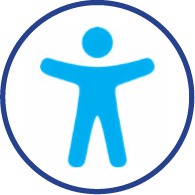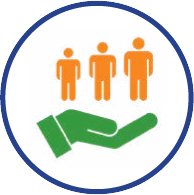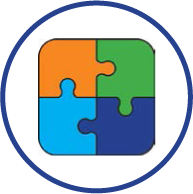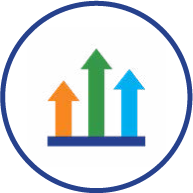Information Access: Frequently Asked Questions
FAQs
Find answers to frequently asked questions by info access value:
 Accessibility
Accessibility
Clear language is straightforward and avoids jargon. In terms of reading level, we aim for a 5th-8th grade reading level. View tutorials in our Accessibility Resource Booklet “Write at a 5th – 8th Grade Level” section. These tutorials are for PC and MAC systems. You can also try the Hemingway Editor or an AI program such as ChatGPT, Microsoft CoPilot or Gemini. When using AI, request “clear language” and review the content before publishing.
Use “How to Develop Products for Adults with Intellectual Developmental Disabilities and Extreme Low Literacy.” This user guide has advice for sharing information through stories and pictures. You can also make videos.
This depends on who you are serving, their preferences and their needs. For example, you can share your info through your website, newsletters, infographics, videos, comics or more.
Access to information is a fundamental right. Organizations must provide reasonable accommodations. This is a legal requirement under the Americans with Disabilities Act (ADA). For braille transcription resources, see the American Council of the Blind’s list of Producers of Braille Documents. You can also ask Domonique Lawless from the Virginia Department for the Blind and Vision Impaired (DBVI) for more resources at (804) 371-3112 or Domonique.Lawless@dbvi.virginia.gov. For information on ASL interpreters, visit the Virginia Department for the Deaf and Hard of Hearing (VDDHH) Interpreter Services Program page. State and local agencies can call about the VDDHH Interpreter Services Agreement at (804) 662-9502.
View tips from our Accessibility Resource Booklet “Create an Accessible Website” section. You may find these two items most useful: 1) Introduction to Web Accessibility and 2) Guidance on Web Accessibility and the ADA.
 Inclusion
Inclusion
Your culture and beliefs affect the way that you share info. This can happen without you realizing.
For example, a person might say, “When a child becomes an adult, they should live on their own to be independent.” This statement assumes that the child is a part of Western culture. In other cultures, the child may be expected to live with their parents until they have married. Another person may make a flyer about family services. The flyer could have pictures of families that have one mom, one dad and a child. This flyer could imply that there is only one type of family. In reality, families may have two moms, two dads, one or two grandparents or other adoptive guardians.
Learn more from our Inclusion Resource Booklet “Respect All Cultures, Types of Families and Languages” section.
Machine language translators like Google Translate can give bad translations. Native speakers and professional translation services will always give the best translation. This is because humans understand context, while machines don’t.
Learn more from our Inclusion Resource Booklet “Translate Information So Meaning and Intent Are Not Lost” section.
This depends on who you serve. Find out what languages they speak and prefer. For example, maybe the people you serve only speak English and Mandarin Chinese. In this case, you would translate for Mandarin Chinese, not Spanish. Check what common languages are spoken and preferred in your area. To begin, view 2022 U.S. Census Bureau data on Language Spoken at Home for your Congressional District or county/city. The U.S. Census Bureau’s data is a great starting point. You may want to do your own surveys too.
Translate the most critical information first. Consider machine translation AND work with a group of bilingual volunteers. Use machine translation (such as Google Translate and iTranslate) with caution. Please also note that volunteers may not provide the same quality as a certified translator. Work with local cultural organizations or universities. The organizations and universities may offer translation at a reduced cost. Plan to include more translations over time, as your budget allows.
 Collaboration
Collaboration
“Lived experience” is the expert knowledge that people get from their lives. For us, “people with lived experience” are people with disabilities and family members. They know the needs and barriers of people with disabilities because they have lived through those experiences.
Learn more from our Collaboration Resource Booklet “Lived Experience of People with Disabilities and Families is a Part of Solutions” section. You can also talk to local or state self-advocacy groups such as the ALLY Alliance.
We pay people with disabilities and family members for their lived experience. They are experts on their needs and how services impact them. We value and pay them for their time. Paying for their feedback will benefit your organization and services. When you know your audience, you can effectively communicate with them.
At minimum, you should pay people with disabilities and family members when you ask for their expert opinion or lived experience. For example, you should pay them for interviews, panels, focus groups and when they lead or assist in trainings.
We recommend paying at least $25 per hour. The Independent Sector recommends $33.38 in Virginia, based on their calculations of the Value of Volunteer Time.
Start small by offering small stipends or gift cards. Gradually incorporate these payments into your annual budget. The insights and feedback you gain are invaluable and will pay off in the end.
 Continuous Improvement
Continuous Improvement
You should get feedback every time you share or develop new information. You can involve people with lived experience at any point of the process.
Feedback is a type of data. Data can be any comments, details or statistics that help your organization to improve. You can still use data without an official data analyst. Learn more from our Continuous Improvement Resource Booklet “Use Feedback and Data to Improve” section.
Get creative! What can you do that does not go against policy or need approval? Highlight the positive impact of your efforts through success stories. Share these stories in your end-of-year evaluations or during meetings. Continue in your good work. Lead by example and work on this with your peers.
Other
We are building a community that will support each other and keep each other accountable. Change will take a long time, but it will be worth it. A Champion is always improving and never gives up.
Always seek feedback. The people that you serve will tell you if you are doing well, or if there are ways that you can improve.
We plan to hold Question & Answer (Q&A) sessions, training sessions and more. When you pledge to be an Information Access Champion, we add you to our Constant Contact list. We will email you about these events. Feel free to email us at infoaccess@vbpd.virginia.gov to suggest other event ideas.